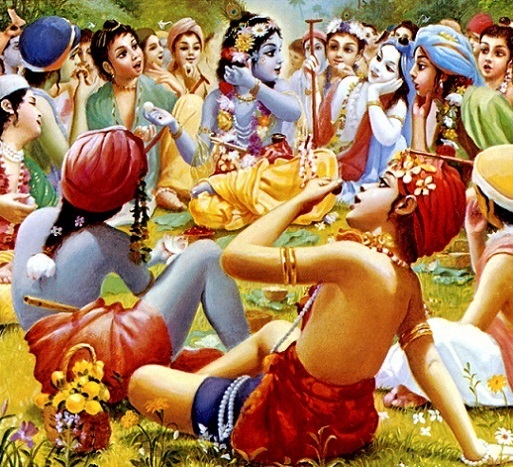(Click to enlarge painting of Krishna and the cowherd boys of Vrindavan)
Devotee: Is there a difference in the quality of service between a person who is... just accepts outright Kṛṣṇa, service to Kṛṣṇa, and one who wants to scrutinize and inquire more and more about it, between someone who just accepts, "That's it, this and this," and someone who inquires more and more?
Prabhupāda: One who loves Kṛṣṇa without inquiry, that is nice position. To inquire about Kṛṣṇa is knowledge. And pure devotion is transcendental to knowledge. Love does not depend on the greatness. If a boy loves a girl or the girl loves a boy, even in this material field, it does not depend on the greatness of the boy. Of course, here everything is on material consideration. But actual love is without any consideration, what He is or what she is. That is real love. That is the perfectional stage of love: without inquiring how great He is or what He is. But for the neophytes it is necessary to know about Kṛṣṇa. Because we have no love, so if we understand that Kṛṣṇa is so great, then gradually we can love Him.
Our position is different, because when...therefore Caitanya-caritāmṛta, it is said that siddhānta boliya citte na kara ālasa (CC Adi 2.117). "Try to understand about Kṛṣṇa." Just like Kṛṣṇa is explaining in Bhagavad-gītā that, "I am this amongst the trees. I am this. I am this planet. Amongst this, I am this. I am this." So just to impress upon the neophyte devotee about the greatness... and those who are advanced devotee, they do not want to see whether Kṛṣṇa is great or small. They simply love Him. That's all. That is pure love. In Vṛndāvana, at least these gopīs, they never saw Kṛṣṇa's any jugglery or any greatness. But they still love, pure love. Pure love means:
anyābhilāśitā-śūnyaṁ
jñāna-karmādy-anāvṛtam
ānukūlyena kṛṣṇānu
śīlanaṁ bhaktir uttamā
(Brs. 1.1.11)
Without any cultivation of knowledge, without any activities of fruitive action, without any desire, simply to love Kṛṣṇa in order to please Him—that is the highest perfectional stage of devotion. There is no consideration, "Whether Kṛṣṇa is God or not. Whether we are getting benefit or not." "Simply we love Kṛṣṇa." That is the perfectional stage. This is the highest stage. The stage of the gopīs or the cowherds boy playing with Kṛṣṇa, oh, they are kṛta-punya-puñjāḥ. Many, many lives they have undergone many types of sacrifices, austerities, penances, and then they have come to that stage. That stage is not ordinary stage. In the Śrīmad-Bhāgavatam Śukadeva Gosvāmī says:
itthaṁ satāṁ brahma-sukhānubhūtya
dāsyaṁ gatānāṁ para-daivatena
māyāśritānāṁ nara-dārakeṇa
sākaṁ vijahruḥ kṛta-puṇya-puñjāḥ
(SB 10.12.11)
He is describing when Kṛṣṇa was playing with His cowherds boy. So he is describing that "These cowherds boy—who are they? They are living entities who have amassed volumes and volumes of pious activities." Kṛta-puṇya-puñjāḥ. "After many, many lives, just like bank balance increases, similarly, one who has increased the balance of pious activities for many, many thousands of lives, oh, such persons are now playing with Kṛṣṇa. They have taken the body of these cowherds boy, transcendental, spiritual body, and just they are playing with Kṛṣṇa. And who is Kṛṣṇa?" Itthaṁ satāṁ brahma-sukhānubhūtya: "The great saints and sages who are trying to understand the Supreme Brahman, here is Kṛṣṇa. That Supreme Brahman is here, playing."
Itthaṁ satāṁ brahma-sukhanubhutya dāsyaṁ gatānāṁ para-daivatena: "The impersonalist Brahman is . . . because Kṛṣṇa's effulgence is impersonal Brahman, so here is He." And dāsyaṁ gatānāṁ: "Those who are devotees, those who have accepted Kṛṣṇa as the master, for them here is Kṛṣṇa." And māyāśritānāṁ nara-dārakeṇa: "And those who are materialistic—they simply think Kṛṣṇa is ordinary boy or man—He is also there. But who are these boys? They are playing with the same person who is Brahman, who is Bhagavān, or who is ordinary man, according to different calculation. But these boys who are playing with Him, they have accumulated many, many lives' heaps of pious activities." They are not ordinary men.
So all these gopīs, all the cowherds boy in Vṛndāvana, they are not ordinary living entities. They have approached that stage after many, many pious activities. Yeṣāṁ tv anta-gataṁ pāpaṁ (BG 7.28). After brahma-bhūtaḥ prasannātmā na śocati na kāṅkṣati (BG 18.54). Their position is different. Therefore they have reached that unalloyed stage: without any consideration, simply loving Kṛṣṇa. That stage they have passed already. There is no such consideration. Pure love. That is pure love. Pure love means anyābhilāśitā-śūnyaṁ jñāna-karmādy-anāvṛtam. There is no question of knowledge. What these gopīs...? They were damsels, cowherds girls. They had no study of Vedānta or anything knowledge. Simply ordinary village girls. How they attained such love for Kṛṣṇa? That is not ordinary thing.
So it is not a thing that one should attain the transcendental loving platform of Kṛṣṇa by studying. No. Vinā mahat-pāda-rajo 'bhiṣekam (SB 5.12.12). It can be achieved by the grace of Kṛṣṇa or by the grace of Kṛṣṇa's devotees. It is not that because one is very learned, he will become Kṛṣṇa conscious. Or because one is rich, therefore he will become Kṛṣṇa conscious, or because one is great mystic, therefore he will... no. That will come... vinā mahat-pāda-rajo 'bhiṣekam. It cannot be achieved without touching the dust of lotus feet of a great devotee. That is the effect. Therefore Caitanya Mahāprabhu has recommended,
sādhu saṅga sādhu saṅga sarva śāstra kaya
lavamātra sādhu saṅge sarva siddhi haya
(CC Madhya 22.54)
So this association is required. If you can make your Kṛṣṇa consciousness society perfectly Kṛṣṇa conscious, wherever you will go, they will become Kṛṣṇa conscious, simply by your presence. So you have to become perfectly Kṛṣṇa conscious. There should be no adulteration. That adulteration means that knowledge and fruitive activities and material desires. If Kṛṣṇa consciousness is free from these three kinds of contamination, then that is pure.
(Srila Prabhupada Lecture, Montreal, July 2, 1968)
.
